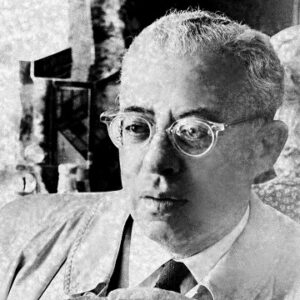Saul Alinsky, who was named one of New York magazine’s “purest Avatars of the populist movement” and is widely regarded as “the father of community organizing,” dedicated his entire life to helping the poor. This tough but compassionate humanitarian pioneered new approaches to assisting the poor, dispersed throughout the world, in improving their communities and raising their social and economic status. To work with communities, he combined urban theories he had learned in university with the street smart ways he had learned growing up in Chicago. He was active in prisons, labor unions, churches, and other social groups. He would visit a neighborhood, listen to its residents’ needs and problems, and work with them to help them achieve their goals, either by bringing it to the attention of the government or corporations. He worked with impoverished communities all over North America, including African-American ghettos in California, Michigan, New York City, and other troubled and impoverished areas. ‘Rules for Radicals,’ one of his best-selling books, provides guidelines for future community organizers. His legacy lives on and continues to inspire countless people.
Childhood and Adolescence
Saul David Alinsky, the only surviving son of Russian Jewish immigrant couple Benjamin Alinsky and Sarah Tannenbaum Alinsky, was born on January 30, 1909 in Chicago, Illinois.
He feared that his parents would force him to become a rabbi because of his strong and orthodox Jewish upbringing. He went on to the University of Chicago and majored in archaeology.
After a two-year stint in graduate school, he went to work for the state of Illinois as a criminologist. He also worked part-time for the Congress of Industrial Organizations as an organizer.
Career of Saul
Around 1939, he became involved in general community organizing activities with the goal of uniting the poor in Chicago to collectively voice their rights. He had put a halt to labor movement activities by this point.
For the next ten years of his life, he devoted much of his time to assisting slum communities across the country. To name a few places where he worked, he was in Kansas City, Detroit, and California.
Later in the 1930s, he worked in Chicago’s ‘Back of the Yards’ industrial district. As a result, the ‘Industrial Areas Foundation’ was founded, with the goal of empowering poor communities.
Around 1950, he dedicated his time to improving the social and economic conditions of Chicago’s African-American ghettos. Mayor Richard J. Daley was enraged by his actions.
He traveled to California at the request of the San Francisco Bay Area Presbyterian Church, with the goal of organizing African-American ghettos in Oakland. The Oakland City Council, however, prohibited him from entering after hearing the news.
In 1971, he published a book called “Rules for Radicals: A Pragmatic Primer for Realistic Radicals.” This book included recommendations for the next generation of community leaders.
Major Projects of Saul
One of his seminal works, ‘Rules for Radicals: A Pragmatic Primer for Realistic Radicals,’ was a blueprint for future community leaders and organizers. Over the last four decades, the government has widely implemented his principles.
Achievements & Awards
He was awarded the Pacem in Terris Peace and Freedom Award in 1969.
Personal History and Legacy
He had three marriages. Helene Simon, his first wife, drowned while attempting to save their daughter from drowning in Lake Michigan. He married Jean Graham and then Irene McGinnis later in life.
During his first marriage, he had two children, Kathryn and David, whom he adopted. He died in Carmel, California, on June 12, 1972, at the age of 63, after suffering a heart attack.
‘Let Them Call Me Rebel: A Biography of Saul Alinsky,’ was written by Sanford D. Horwitt. ‘The Democratic Promise: Saul Alinsky and His Legacy,’ a documentary about his life, depicts how he came up with new and innovative ideas to organize the poor across America.
Many American leaders and politicians have been influenced by his teachings, including Ed Chambers, Barack Obama, Tom Gaudette, Ernesto Cortes, Michael Gecan, Wade Rathke, and Patrick Crowley. Community leaders such as Cesar Chavez and Dolores Huerta were influenced by him.
Estimated Net Worth
Saul is one of the wealthiest activists and one of the most well-known activists. According to our research, Saul Alinsky’s net worth was around $22 million before he died, according to Wikipedia, Forbes, and Business Insider.
Trivia
This community leader and organizer instructed his volunteers to occupy all of the bathrooms in the O’Hare International Airport for an entire day during one of his protests for better rights for impoverished communities to show the elite what it’s like to live without these facilities. This brought the issue to the Mayor’s attention.


